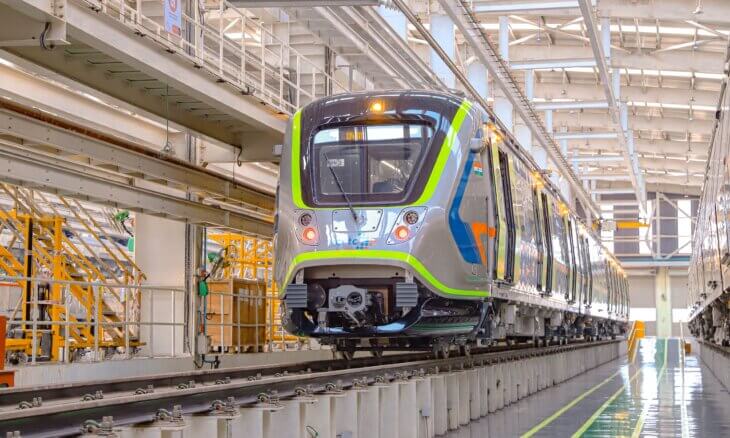
The National Capital Region Transport Corporation (NCRTC) has taken a significant step forward in its ongoing Delhi-Ghaziabad-Meerut Regional Rapid Transit System (RRTS) project by unveiling a dedicated Meerut Metro train. This development marks a key milestone in the broader 82 km RRTS project, which aims to enhance connectivity between the three cities.
The three-coach Meerut Metro train was recently introduced in Ghaziabad and is currently undergoing test runs at the Duhai Depot. The new Metro service is designed to operate on a 23 km stretch within Meerut, offering enhanced transit options for local commuters. This route, part of the larger RRTS network, is projected to be fully operational by June 2025.
The RRTS corridor, upon completion, will feature two distinct train services in Meerut. The six-coach Namo Bharat trains, known for their high-speed capabilities, will serve four key stations, while the Meerut Metro trains will cater to all 13 stations along the route. Both services will share the same infrastructure, ensuring seamless integration and convenience for passengers. Provisions have been made at the stations to accommodate the smooth operation of both trains.
Currently, 42 km of the RRTS corridor, spanning from Sahibabad in Ghaziabad to Meerut South in Meerut, is already operational. The entire 82 km corridor is expected to be completed by June 2025, significantly enhancing regional connectivity.
The Meerut Metro trains, built with a sleek, modern design, are engineered for efficiency and comfort. With a design speed of 135 km/h and an operational speed of up to 120 km/h, these trains are equipped with features such as air conditioning, ergonomic seating, luggage racks, USB mobile charging points, and advanced safety systems. Each train can accommodate over 700 passengers, offering both seating and standing room.
The introduction of the Meerut Metro train and the ongoing test runs signal NCRTC’s commitment to delivering a state-of-the-art transit system that meets the growing demands of the region’s commuters. As the project progresses, residents of Meerut and the surrounding areas can look forward to faster, more efficient travel options that will significantly reduce travel time between Delhi, Ghaziabad, and Meerut.

